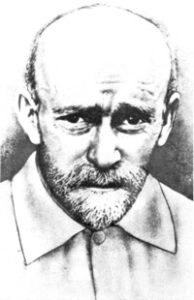Janusz Korczak - A word about Korczak

Henryk Goldszmit (1878 or 1879-1942), known under the pen name Janusz Korczak and the radio name Stary Doktor (“Old Doctor”), doctor by education and profession, writer by talent, educator and pedagogue by vocation and choice and, above all, an unusual precursor of children’s rights, creator of a new educational system based on children’s needs and aspirations, which is to lead to activity and independence through various forms of child self-government; director of the Jewish Orphan House in Warsaw (1911-1942) and since 1919 co-founder of the educational institution Nasz Dom (“Our Home”) – for Polish children, lecturer at the Institute of Special Education and Free Polish University; co-worker of many magazines and creator of the first Mały Przegląd [Little Review] – children’s magazine edited together with children, author of radio conversations – talks of Old Doctor. Author of pedagogical books: How to Love a Child [Jak kochać dziecko] (1920), The Child’s Right to Respect [Prawo dziecka do szacunku] (1928), Educational Moments [Momenty wychowawcze] (1919), The Rules of Life [Prawidła życia] (1930), Playful Pedagogy [Pedagogika żartobliwa] (1939), the most famous books addressed to children: Mośki, Joski i Srule (1909), Józki, Jaśki i Franki (1910), King Matt the First [Król Maciuś Pierwszy] (1922), King Matt on a Deserted Island [Król Maciuś na wyspie bezludnej] (1923), Bankruptcy of Little Jack [Bankructwo małego Dżeka] (1924), When I Am Little Again [Kiedy znów będę mały] (1925), naturalistic social novels: Children of the Streets [Dzieci ulicy] (1901), Child of the Drawing Room [Dziecko salonu] (1906), social satires – Fiddle-Faddle [Koszałki opałki] (1905), dramatic works such as Senat szaleńców [Madmen’s Senate] (1931). His last work – Diary [Pamiętnik] from the Warsaw ghetto (1942). He felt he belonged to the dual culture and nationality, as a Jew-Pole he was active in both communities, also to bring them closer together. Despite the chance to leave the ghetto, he remained with his orphans, whom he accompanied in their last journey, and was deported with them to the Treblinka extermination camp.





